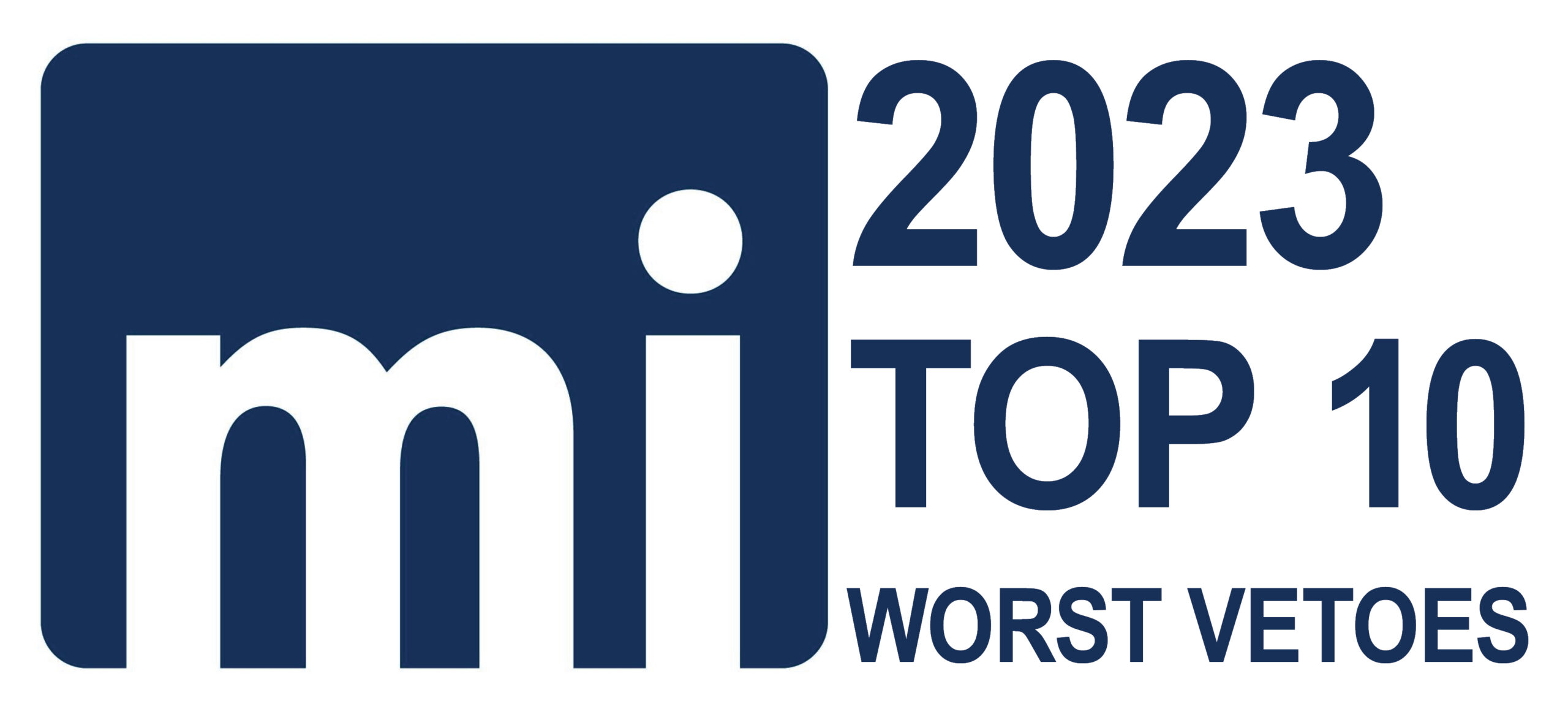
We’ve come to the end of another eventful year and that means it’s time for MacIver’s Top 10 lists. We start with the Worst Vetoes of 2023.
The session is nearly a year old, and between the budget and non-fiscal bills the legislature has passed and sent to the governor, there have been 68 vetoes – 51 partial vetoes in the budget and 17 full vetoes of bills. Some of the vetoes were worse than others. One notable positive veto made sure that when the state provided $10 million to WisconsinEye, they had to provide free public access to their programming.
But by and large, the vetoes have cost taxpayers money and prevented sound, common-sense policies from becoming law. Let’s begin the countdown:
#10 Medicaid Dollars for Transgender Surgery
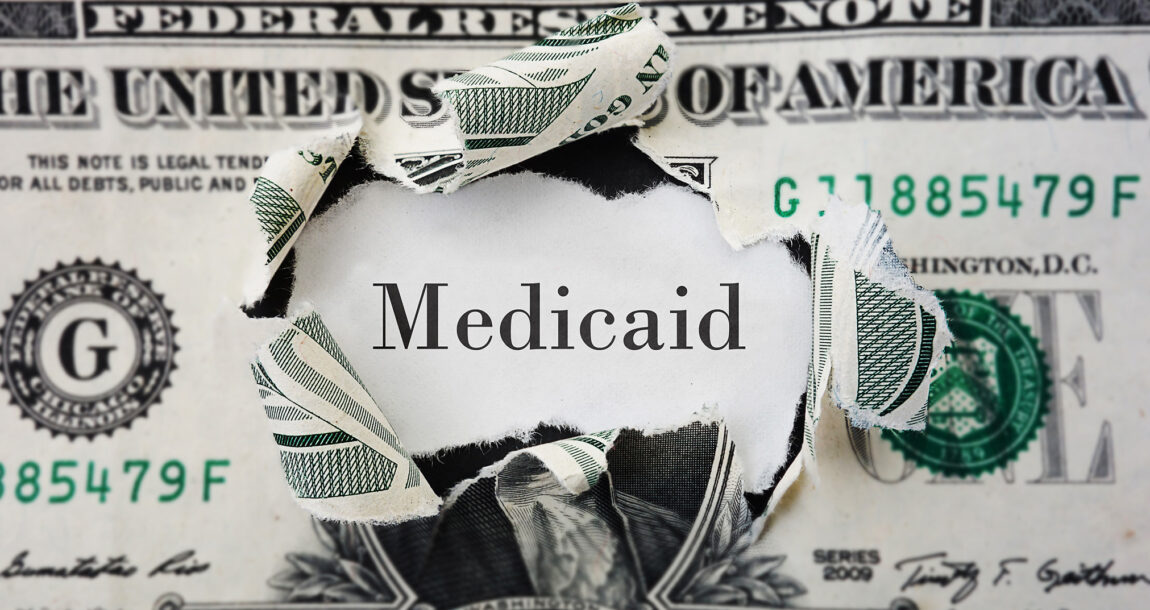
The legislature included in the budget a provision that would have banned – to the extent allowable by federal law – the use of state dollars in the Medicaid program – which provides health care coverage to a quarter of the state’s population using tax dollars – to be used for gender reassignment surgery and puberty-blocking medications used for gender transition.
In 2018 a court ordered Wisconsin’s Medicaid program to pay for transgender surgeries for 2 MA recipients, citing potential irreparable harm if the state did not pay for their surgeries. At that time, there were an estimated 5,000 transgender recipients of Medicaid; that number has almost certainly increased since the program enrollment is roughly 25% higher now than in 2018.
Some estimates put the cost of gender-altering surgeries including hospitalization at roughly $140,000 to transition from male to female, and $124,000 to transition from female to male. This does not cover continuing hormone therapy and other treatments, including mental health.
Evers said in his veto message that limiting the use of tax dollars for gender-altering surgeries and medications was “hateful” and would “magnify inequities in health outcomes.”
#9 Division, Exclusion and Indoctrination
We’ve covered the burgeoning administrative spending in the UW System and in K12 on Diversity, Equity and Inclusion (DEI). In both systems, as Speaker Vos has often said, these positions promote division, exclusion and indoctrination.
In the budget, legislators eliminated 188 DEI positions, and put aside the $32 million the UW spends on those spots. Under the plan, the UW can request those funds from the budget committee with a plan to use them for workforce initiatives.
Evers was unable to restore the cut, although he had threatened to veto the entire budget if there were any cut for the UW. He was able to use his veto to restore the 188 positions, which he did.
This set up the months-long standoff between the Board of Regents and the legislature that saw the Board flipflop and finally accept a deal offered by the legislature. This deal requires the UW to ‘restructure’ just 43 DEI positions and freeze the number of positions for the next 3 years. Make no mistake, this deal falls short of what’s right, but it’s a small step in the right direction. It’s astonishing to see how important promoting anti-white racism is in the education establishment and on the left.
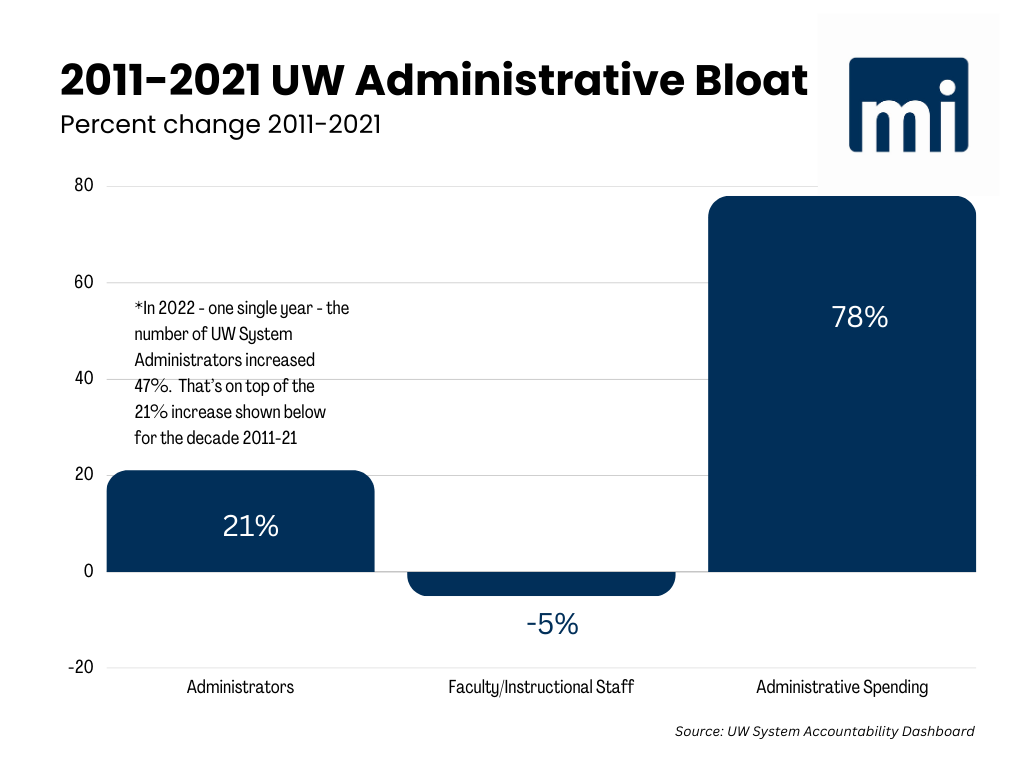
#8 Scold and Release Prosecutors and Judges

We at MacIver have talked for years about the problems caused by Scold and Release prosecutors that don’t charge, under-charge, and plea bargain away justice for the victims of crime.
A bill authored by Senator Hutton and Representative Rettinger would have helped change this situation. The legislation would have limited the ability of prosecutors to plea bargain away charges of domestic abuse, elder abuse, sexual assault, crimes against children, illegal possession of a firearm, auto theft, and reckless driving without first receiving approval from the court. The courts would be required to submit an annual report of such agreements (and justifications thereof) to the legislature.
The bill also would have prohibited people accused of those crimes from being placed in a deferred prosecution program.
Evers vetoed the bill, saying he objected to restricting the discretion of prosecutors and judges, and because he objects to restricting the availability of deferred prosecution agreements.
End result: prosecutors and judges will continue to cut deals that allow criminals to escape prosecution and punishment, and communities will be less safe.
MacIver’s policy agenda has called for these changes, and we look to see this kind of legislation again – with even more attention to the inappropriately used deferred prosecution/first offenders’ programs.
#7 Workforce Reforms
Evers vetoed a legislative workforce package including reforms to the state’s unemployment insurance program. The bill would have required the Department of Workforce Development (DWD) to; begin rulemaking to comply with state law regarding drug testing for UI benefits, perform fraud checks weekly to verify status of UI recipients, and require recipients make direct contacts with employers and maintain a resume on the state job center website.
In addition to these requirements, the department would have been required to provide additional reemployment services to UI recipients. We’ve written extensively about the huge growth in welfare programs, and voters in the state overwhelmingly voted in support of requiring those receiving benefits to work.
But although Evers has in the past said ‘the will of the people is the law of the land’ when it came time to back up those words on this bill, he said that the drug testing and work search requirements “created additional barriers” for people receiving benefits.
That pretty much sums up the difference between the right and the left on workforce issues: the right is interested in removing barriers to people getting employment
#6 Guaranteed Income, Optional Work
We’ve talked about our concerns with the growth of ‘guaranteed income’ or ‘universal basic income’ schemes. These are programs where local, or state governments provide cash (tax dollars and/or private funds) to low-income households – without any requirements or strings attached. That means no work requirements, no training requirements, and no requirements that it is spent responsibly or for necessities. These handouts are on top of the huge bill taxpayers already foot for huge and ever-growing welfare programs.
Across the country, local governments help fund or use taxpayer-funded staff and other tax-funded resources to administer guaranteed income programs. The city of Madison is one of 50-60 cities that administer such a program; participants get $500 a month on top of any other welfare assistance or income they receive. We’ve already voiced concern that the Milwaukee Bailout and their shared revenue increases will allow their proposed guaranteed income plan take wing.
Senator Stroebel and Representative Binsfield authored a modest ban on local governments providing guaranteed cash payments using tax dollars. The bill wouldn’t have banned the use of government staff, or any other kind of government resources, to support guaranteed income programs.
Though voters went to the polls this year and overwhelmingly said they wanted welfare recipients to work for their government benefits, Evers vetoed the bill earlier this month saying he objected to the legislature trying to restrict local governments (who saw a 37% increase in shared revenue payments from the state this year) in how they spend their funds.
#5 Election Integrity and Transparency
Evers vetoed two more election integrity and transparency bills; one would have closed current loopholes allowing the misuse of indefinite confinement voting status, and the second would have limited the purchase price charged for the state voter list to $250 from the current cap of $12,500.
Current law allows voters to ‘self-identify’ as indefinitely confined, and many people have done so when the pandemic revealed that doing so could be used a way to evade our photo ID requirements. The bill would have set guiderails for defining indefinite confinement and required proof of identification, with exceptions for voters (such as many in nursing homes) who do not have photo ID.
Evers’ veto message said he objected to every component of the bill; the definition of confinement, having voters fill out a form to confirm their confinement, the removal of the thousands of people who self-identified as indefinitely confined during the pandemic and are now falsely using the special designation.
Wisconsin’s charges for purchasing the voter list is out of line with most other states, which generally charge less than $2,500, with some providing the lists at no charge. Evers said he objected to WEC having to forgo the revenue.
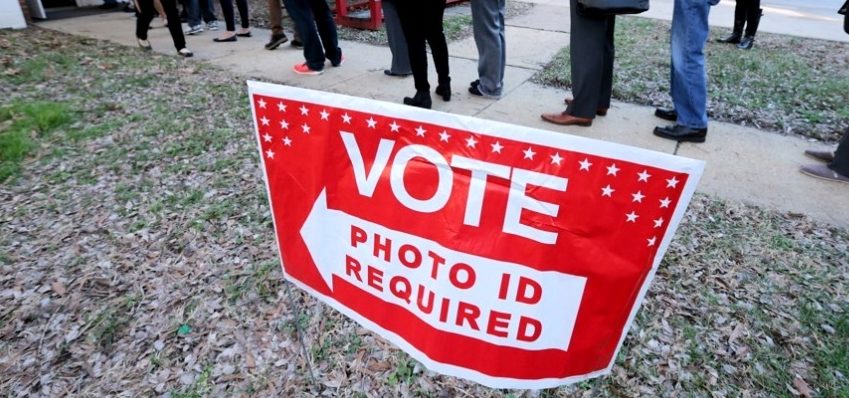
#4 Gender-Manipulation of Minor Children
We’ve reported on what peer-reviewed scientific research says about gender and gender-manipulating medical interventions. We’ve told the stories of gender transition survivors.
Legislators passed legislation this fall barring transgender surgeries on minors, as well as so called “gender-affirming” medical interventions on minors including the use of chemical castration drugs and other puberty-blocking hormone therapy.
Effects of these extreme and invasive medical interventions may be irreversible, and 22 other states have enacted measures to protect children from gender-manipulation treatments.
Evers has promised to veto bills that would limit these often experimental and unproven treatments, so unsurprisingly vetoed this bill, even though it focused on protecting children. It’s clear that political support from Evers’ constituency of gender-deniers trumps the well-being of Wisconsin kids for him.
#3 Voter ID Improvements and Verification of Citizenship
Evers vetoed a common-sense election integrity bill to require verification of the citizenship of people registering to and to mark the drivers’ licenses of non-citizens to designate that the ID is not valid for voting purposes. This should be one of those reforms that everyone can support because it would help improve election integrity and restore some confidence in elections. But those are not on the left’s agenda.
In his veto message, Evers referenced the “many different ways that state issues identified identifications are used in everyday settings” – a message that would seem to contradict his assertions that voter ID is so incredibly difficult to obtain that it shouldn’t be a requirement to vote.
#2 Returning the Budget Surplus to Taxpayers

First, Evers vetoed the $3.5 billion tax cut the legislature included in the budget that would have returned at least a portion of the historic $7 billion surplus to the taxpayers. Evers’ veto slashed the amount of legislature’s tax cut by 95%, leaving only a small cut that returned just $175 million to taxpayers.
The legislature came back in the fall with another tax cut plan that would have returned $2.2 billion of the now-$4 billion surplus to taxpayers. Under the plan, every taxpayer with income above $27,630 would have seen a tax cut and the childcare and dependent tax credit would have been expanded.
The tax cuts would have provided an average decrease of $641 for taxpayers in 2023.
Evers vetoed this tax cut as well, calling it “completely unserious.”
That means the state is still sitting on billions of excess tax collections, taxpayers are waiting for it to be returned, and there are still months of legislative session where the government will be tempted to spend the money rather than return it.
We’ve long touted the benefits of a fair, flat tax – and as more states are moving in that direction, Wisconsin’s governor has used his veto authority to further unbalance and disequalize tax rates in the state, while turning back effort after effort to return huge budget surpluses to taxpayers.
#1 Obligating Four Centuries of Taxpayers to Evers’ Education Spending Increases
Governors over time have stretched their use of Wisconsin’s broad gubernatorial veto power. At times that stretching has resulted in voters amending the constitution to dial back what were perceived as abuses of that power. It’s still plenty broad, and this year Evers stretched it 402 years into the future, with this veto:
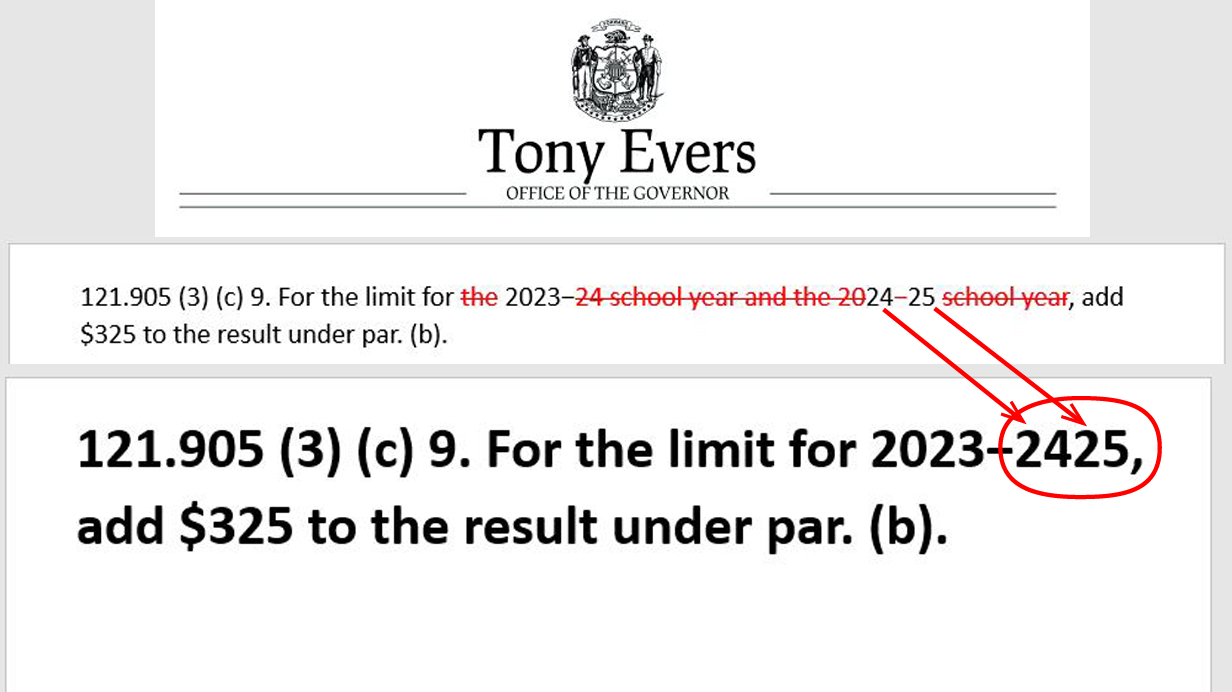
Evers took the $325 annual per pupil increase he and legislators negotiated for this budget and made that increase law for every year of the next 4 centuries. If one assumes roughly the same number of students for each of those years, this provision obligates future generations of Wisconsin taxpayers to something in the neighborhood of $110 billion in additional spending.
Look for more Top 10 lists that will recap the best and the worst of 2023.